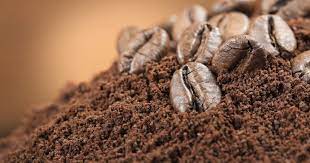
Coffee in the morning may benefit the environment.
That is the claim made by an Australian university that they would be able to reduce greenhouse gas emissions by adding spent coffee grounds to concrete, making it stronger and more sustainable.
According to the UN, the process of making concrete, which entails combining cement, water, and sand and gravel, is a significant contributor to greenhouse gas emissions, accounting for around 7% of global emissions.
By heating coffee trash without oxygen—a process known as pyrolysis—researchers at RMIT University in Melbourne have produced a material called biochar that can replace up to 15% of the sand used in concrete.
Lead researcher Rajeev Roychand stated that adding biochar to the concrete increases its strength by 30% and can save the quantity of cement used by up to 10%.
He remarked, "This checks all the boxes." "You preserve carbon and you are getting significantly higher strength."
According to a 2022 U.N. estimate, some 50 billion metric tonnes of sand are excavated year, primarily for use in concrete. According to the paper, its extraction frequently has a negative environmental impact and its supply is running low.
The majority of the emissions from concrete are caused by the process of making cement, which entails heating a combination of limestone and clay to around 1,500 degrees Celsius (2,732 degrees Fahrenheit).
Earlier last month, the Macedon Ranges Shire Council, located near Melbourne, built a pathway using coffee concrete.
According to Roychand, RMIT is in talks with a number of concrete producers, construction companies, and Starbucks about using its leftover coffee grounds to create biochar. A request for comment from Starbucks was not answered.
The concrete will be tested, and the Australian infrastructure giant Bild Group said it aimed to use it to large-scale road projects. Arup, a massive construction company, funded the study.
Globally, millions of tonnes of spent coffee grounds are generated, the most of which are dumped in landfills where they decompose and release methane.
Because biochar is a denser substance than sand, it has the potential to replace up to 655,000 tonnes of sand in concrete. Australia produces around 75,000 tonnes of discarded coffee grounds annually, according to Roychand.
He claimed that 90 million tonnes of sand used in construction could be replaced globally by biochar made from coffee waste.
The government estimates that food waste makes up 3% of Australia's emissions; most of it might eventually be converted into biochar, according to Roychand.
"We anticipate that about 60-70% (of organic waste) we can divert from landfill into concrete applications," he stated.
The potential of biochar and other bio-engineering in concrete is being investigated by other foreign institutions as well. According to Roychand, RMIT was the first to employ leftover coffee grounds in this manner.
(Source:www.reuters.com)
That is the claim made by an Australian university that they would be able to reduce greenhouse gas emissions by adding spent coffee grounds to concrete, making it stronger and more sustainable.
According to the UN, the process of making concrete, which entails combining cement, water, and sand and gravel, is a significant contributor to greenhouse gas emissions, accounting for around 7% of global emissions.
By heating coffee trash without oxygen—a process known as pyrolysis—researchers at RMIT University in Melbourne have produced a material called biochar that can replace up to 15% of the sand used in concrete.
Lead researcher Rajeev Roychand stated that adding biochar to the concrete increases its strength by 30% and can save the quantity of cement used by up to 10%.
He remarked, "This checks all the boxes." "You preserve carbon and you are getting significantly higher strength."
According to a 2022 U.N. estimate, some 50 billion metric tonnes of sand are excavated year, primarily for use in concrete. According to the paper, its extraction frequently has a negative environmental impact and its supply is running low.
The majority of the emissions from concrete are caused by the process of making cement, which entails heating a combination of limestone and clay to around 1,500 degrees Celsius (2,732 degrees Fahrenheit).
Earlier last month, the Macedon Ranges Shire Council, located near Melbourne, built a pathway using coffee concrete.
According to Roychand, RMIT is in talks with a number of concrete producers, construction companies, and Starbucks about using its leftover coffee grounds to create biochar. A request for comment from Starbucks was not answered.
The concrete will be tested, and the Australian infrastructure giant Bild Group said it aimed to use it to large-scale road projects. Arup, a massive construction company, funded the study.
Globally, millions of tonnes of spent coffee grounds are generated, the most of which are dumped in landfills where they decompose and release methane.
Because biochar is a denser substance than sand, it has the potential to replace up to 655,000 tonnes of sand in concrete. Australia produces around 75,000 tonnes of discarded coffee grounds annually, according to Roychand.
He claimed that 90 million tonnes of sand used in construction could be replaced globally by biochar made from coffee waste.
The government estimates that food waste makes up 3% of Australia's emissions; most of it might eventually be converted into biochar, according to Roychand.
"We anticipate that about 60-70% (of organic waste) we can divert from landfill into concrete applications," he stated.
The potential of biochar and other bio-engineering in concrete is being investigated by other foreign institutions as well. According to Roychand, RMIT was the first to employ leftover coffee grounds in this manner.
(Source:www.reuters.com)














